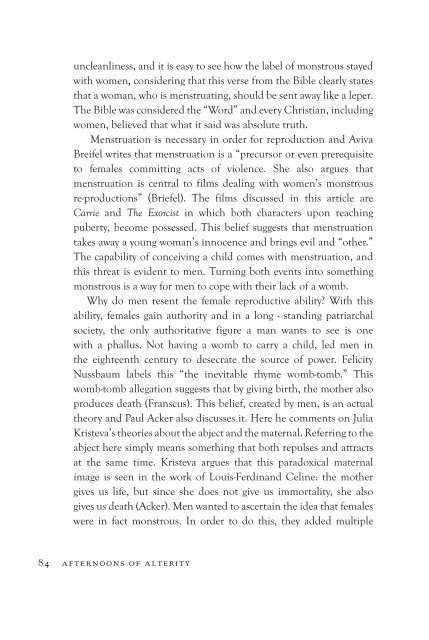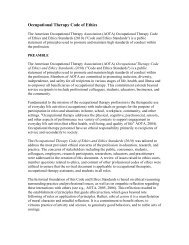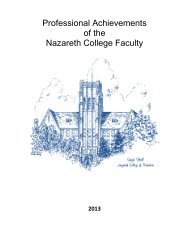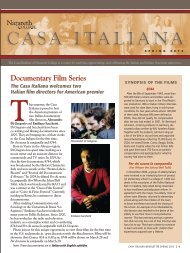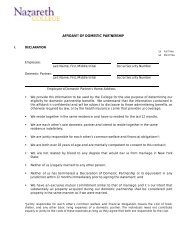Afternoon of Alterity - Nazareth College
Afternoon of Alterity - Nazareth College
Afternoon of Alterity - Nazareth College
You also want an ePaper? Increase the reach of your titles
YUMPU automatically turns print PDFs into web optimized ePapers that Google loves.
uncleanliness, and it is easy to see how the label <strong>of</strong> monstrous stayedwith women, considering that this verse from the Bible clearly statesthat a woman, who is menstruating, should be sent away like a leper.The Bible was considered the “Word” and every Christian, includingwomen, believed that what it said was absolute truth.Menstruation is necessary in order for reproduction and AvivaBreifel writes that menstruation is a “precursor or even prerequisiteto females committing acts <strong>of</strong> violence. She also argues thatmenstruation is central to films dealing with women’s monstrousre-productions” (Briefel). The films discussed in this article areCarrie and The Exorcist in which both characters upon reachingpuberty, become possessed. This belief suggests that menstruationtakes away a young woman’s innocence and brings evil and “other.”The capability <strong>of</strong> conceiving a child comes with menstruation, andthis threat is evident to men. Turning both events into somethingmonstrous is a way for men to cope with their lack <strong>of</strong> a womb.Why do men resent the female reproductive ability? With thisability, females gain authority and in a long - standing patriarchalsociety, the only authoritative figure a man wants to see is onewith a phallus. Not having a womb to carry a child, led men inthe eighteenth century to desecrate the source <strong>of</strong> power. FelicityNussbaum labels this “the inevitable rhyme womb-tomb.” Thiswomb-tomb allegation suggests that by giving birth, the mother alsoproduces death (Franscus). This belief, created by men, is an actualtheory and Paul Acker also discusses it. Here he comments on JuliaKristeva’s theories about the abject and the maternal. Referring to theabject here simply means something that both repulses and attractsat the same time. Kristeva argues that this paradoxical maternalimage is seen in the work <strong>of</strong> Louis-Ferdinand Celine: the mothergives us life, but since she does not give us immortality, she alsogives us death (Acker). Men wanted to ascertain the idea that femaleswere in fact monstrous. In order to do this, they added multiple84 afternoons <strong>of</strong> alterity


